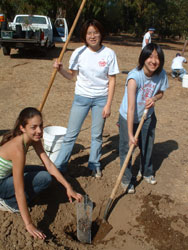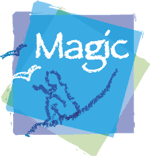Planting for the Second Hundred Years
In 1980, about a decade before Stanford University celebrated its first centennial, Magic began working in partnership with the university's biology faculty and planning staff to restore stable oak populations on the foothills which rise to the southwest of the central campus.
We pursue this work with two purposes. First, we are seeking to enhance the integrity of the foothills ecosystem. Second we are aiming to provide opportunities for people who want to learn about ecology by protecting and restoring the life-supporting qualities of the environment on which all of us depend. To date we have established more than two thousand healthy young oaks. Thousands of volunteers have contributed to make this success possible.

Every week crews ranging in size from a handful to several dozen volunteers take to the field. We hold regular work sessions each Saturday from 9 a.m. until noon during cooler months, and at least one weekday evening for two hours during warmer months. We also make special arrangements to accommodate groups of four or more, or individuals who commit to work on a regular basis for a minimum of two hours per week during an entire academic quarter.
Tasks vary seasonally, and include planting, mulching, watering, suppressing unwanted vegetation, propagating and transplanting native understorey species, repairing fences and other tree protection, collecting acorns, and surveying the condition of young and mature oaks. Throughout the year we also provide office, research, and public outreach opportunities for those who prefer to serve in these ways.
People volunteer with Magic to meet new friends, learn about ecology, enjoy the out-of-doors, and give a bit of themselves to make the world a better place for everyone. Many students find Planting for the Second Hundred Years an enjoyable and informative way to satisfy public service, action project, or internship requirements. A number have successfully integrated volunteer activity with independent study or research for which they received additional academic credit. If you want to lend your heart, head, and hands to make Magic with us, we look forward to hearing from you.
To learn about current opportunities, please look at our programs page or contact Robin Bayer .
For more information about this project and related work, see our papers on Global Climate Change and California Oaks and Holistic Resource Management.


